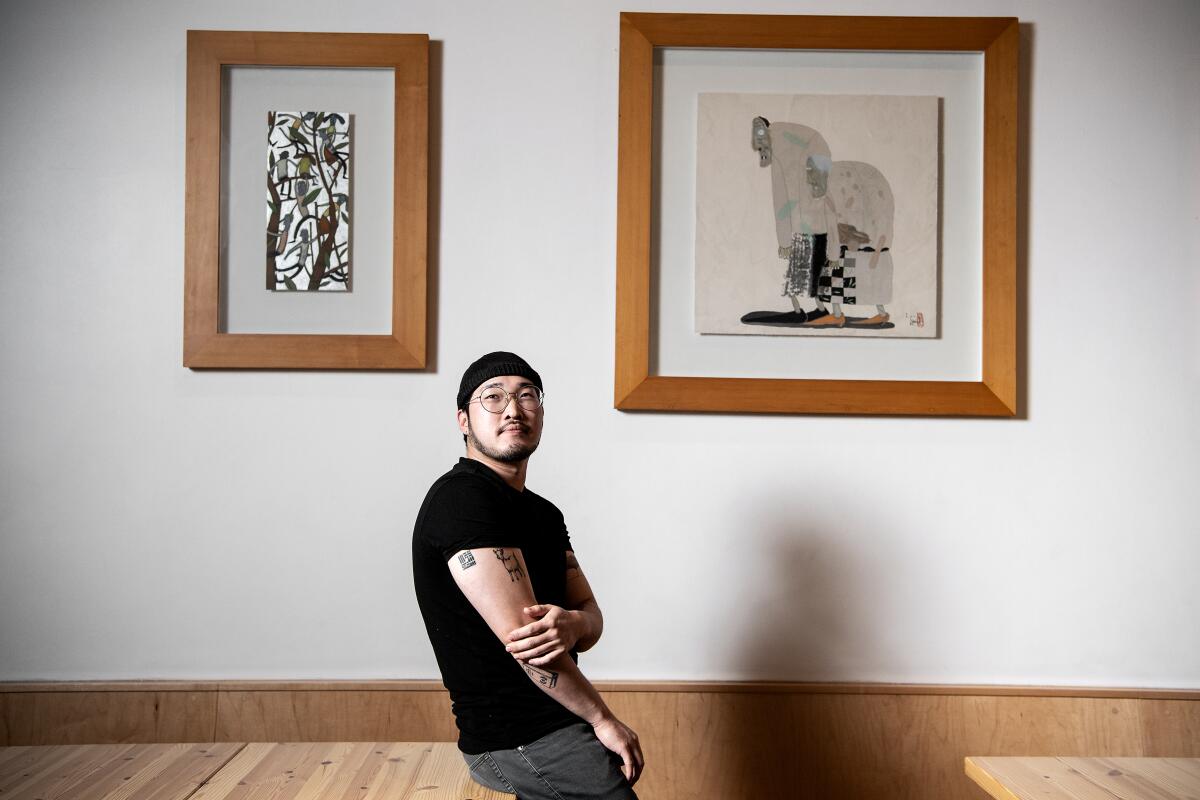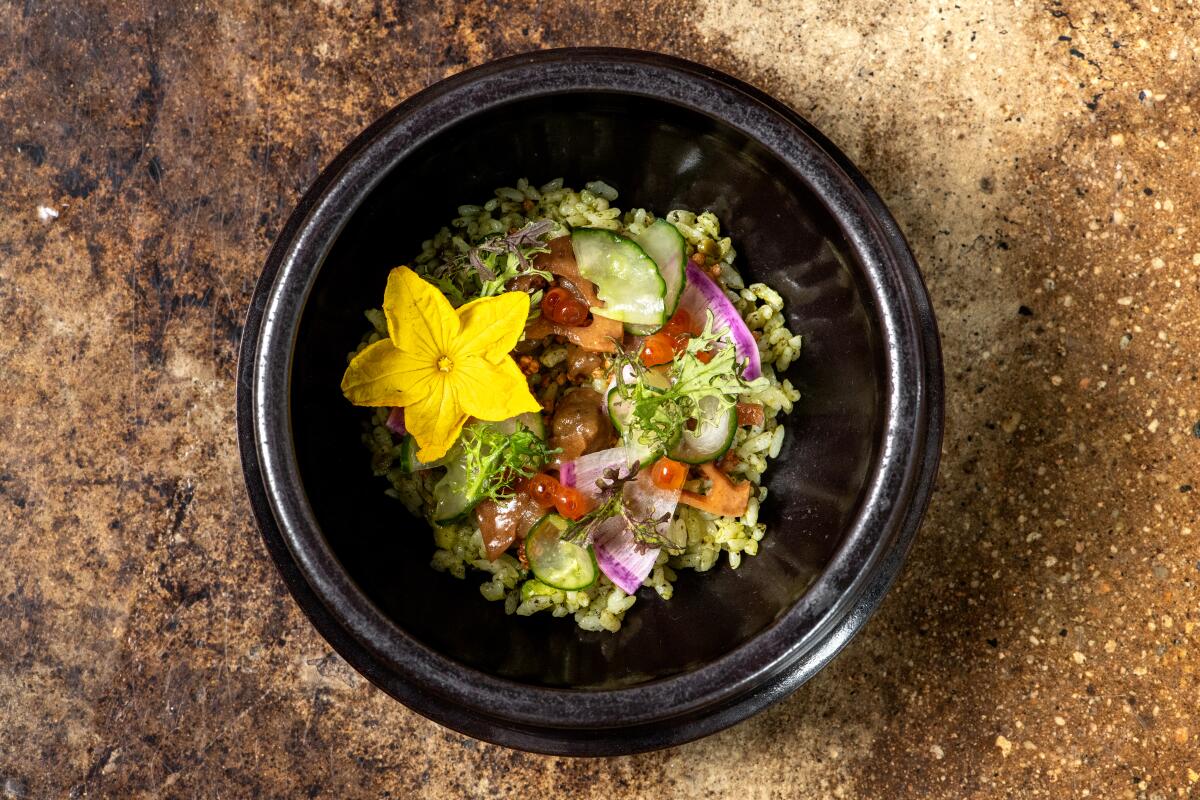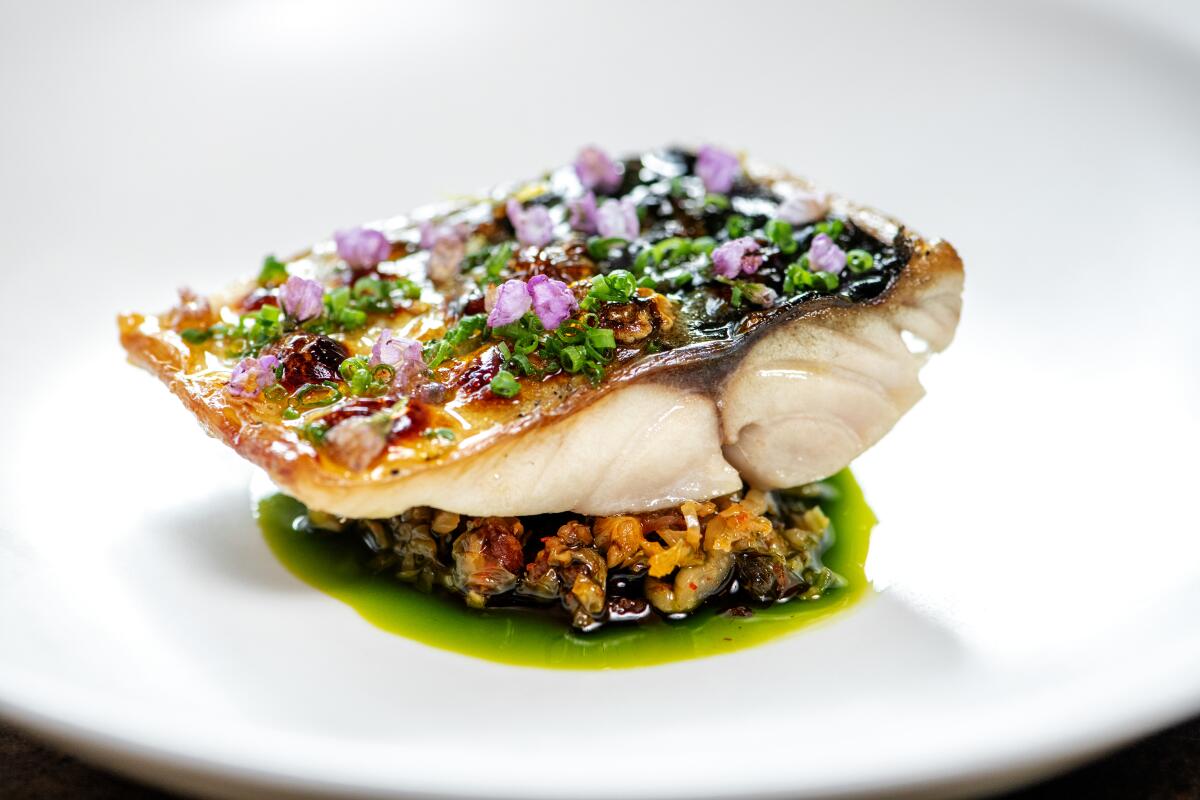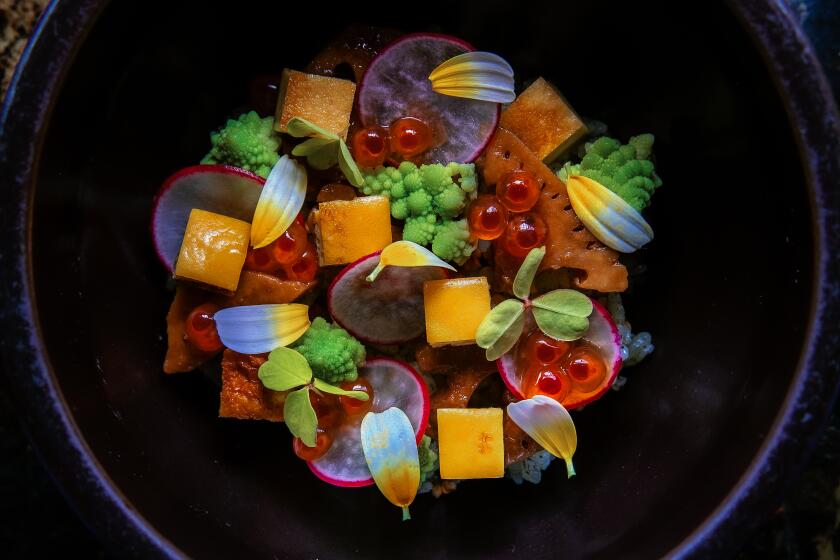On closing L.A.’s Kinn, chef highlights mental health issues in restaurant industry

- Share via
After two years, Michelin Guide recognition and a glowing review from the Los Angeles Times, modern Korean restaurant Kinn is set to close this week, with its chef-owner underscoring the importance of mental health within the restaurant industry.
“I think our products are oftentimes undervalued, we have to make compromises,” said Kiyong “Ki” Kim, who announced Kinn’s closure last Friday. “Whether it’s quality of life, financials, sleep hours, we have to please our guests and please our customers rather than making sure we’re staying healthy. It adds up.”
The Koreatown restaurant’s closure is slated for Saturday. Kim said he lost roughly 20 pounds in the last few weeks due to stress and anxiety. As a chef he characterizes critical praise and seeing customers satisfied as “addicting,” leading to a workforce of chefs who rarely prioritize themselves.
Before opening Kinn, Kim co-founded Korean pop-up Naemo in Los Angeles and worked at San Francisco’s Benu and New York City’s Jungsik and Atomix. The 20-seat Kinn, his first restaurant, is a collaboration with In Hospitality Group — which also operates Koreatown fried chicken shop Chimmelier — and opened in November 2021 with à la carte offerings but quickly reformatted to a tasting-menu setup.
Its five courses expanded to seven and included dishes such as the signature slow-braised crispy octopus, kimchi-stuffed charred Little Gems, peach-glazed bulgogi and tomato-and-perilla burrata salad, evolving each season.

Earlier this year, global dining compendium Michelin Guide added Kinn to its California listings as a new and notable restaurant pick. “Whether preparing dishes or presenting them, the chef and his team deliver an exclusive experience,” the guide said.
Michelin also included Kinn in its guide to the best Korean restaurants in Los Angeles.
In May, L.A. Times Food critic Bill Addison called Kinn “one of the freshest culinary voices in Los Angeles,” described Kim as “masterful” and pondered whether the restaurant could be the future of fine dining in the city.
Though the restaurant is closing, Kinn will still appear at this year’s L.A. Times 101 List event on Dec. 5. The restaurant was initially going to appear on the list, which will be revealed that evening, but Times restaurant critic Bill Addison swapped Kinn for another entry upon hearing the news. “In an effort to make the list as current and helpful for readers as possible, it will not be on the list,” Addison said. “We’re delighted to still welcome him, and honor the great work the Food section said he did.”
“That’s going to be our finale,” Kim said.
Financial and spatial constraints
The premise of offering an ambitious, seven-course tasting menu at an affordable price — $95 per person — also proved difficult for the team, which did not always cross the threshold of necessary sales on a given night. Kim noted that his concerns for the restaurant’s future began in April, due to inconsistent guest seatings and compromises the chef said he had to make given the restaurant’s financial and spatial constraints.
As the months wore on, Kim said his mental health deteriorated, especially after alerting staff last month to the impending end.
What does modern Korean cooking taste like in Los Angeles? A chef with a tiny restaurant and concise tasting menu offers a compelling answer.
Professional chef regularly appears on lists of the most stressful jobs, including earning the No. 1 spot from recruitment company Zippia earlier this year due to long hours, low job security and personnel management in addition to cooking. According to a recent survey by cooking experiences website Cozymeal, 70% of the survey’s participating chefs had experienced anxiety from working in a restaurant, while many also suffered from sleeping disorders, depression and substance abuse.
Multiple nonprofits and other aid organizations exist to help members of the service industry battle depression and addiction, such as Restaurant After Hours, Focus on Health, A Balanced Glass and Healthy Hospo.
“Unfortunately we had to close Kinn due to his [Kim’s] health issue,” In Hospitality Group partner Dustin Dong Hyuk Lee told The Times in an email. “It is very sad, but I’m sure he will come back stronger than ever!”
The outpouring of support has been a shock to the team since the announcement last Friday, with reservations now fully booked for the week, the chef said.
“We’re very, very grateful,” Kim said. “We’ve already seen a lot of familiar faces after we announced, and everyone is reaching out. I didn’t know there were like this many people that cared about us. It’s been very emotional.”

Closing the restaurant has helped Kim find new camaraderie in other chefs who’ve reached out to convey empathy, having closed restaurants themselves, and said the experience has helped him learn to be more empathetic in turn.
“I’m very hopeful now and I’m trying to be as strong as I can be, mentally,” he said.
Kim hopes to remain in L.A. after Kinn’s closure, ideally cooking elsewhere before opening his own restaurant again someday.
“What I really want to do is focus on the present moment, but I’m very excited for the future. I feel like what the future holds is very bright — and it’s even brighter than the prime of Kinn.”
More to Read
Eat your way across L.A.
Get our weekly Tasting Notes newsletter for reviews, news and more.
You may occasionally receive promotional content from the Los Angeles Times.












